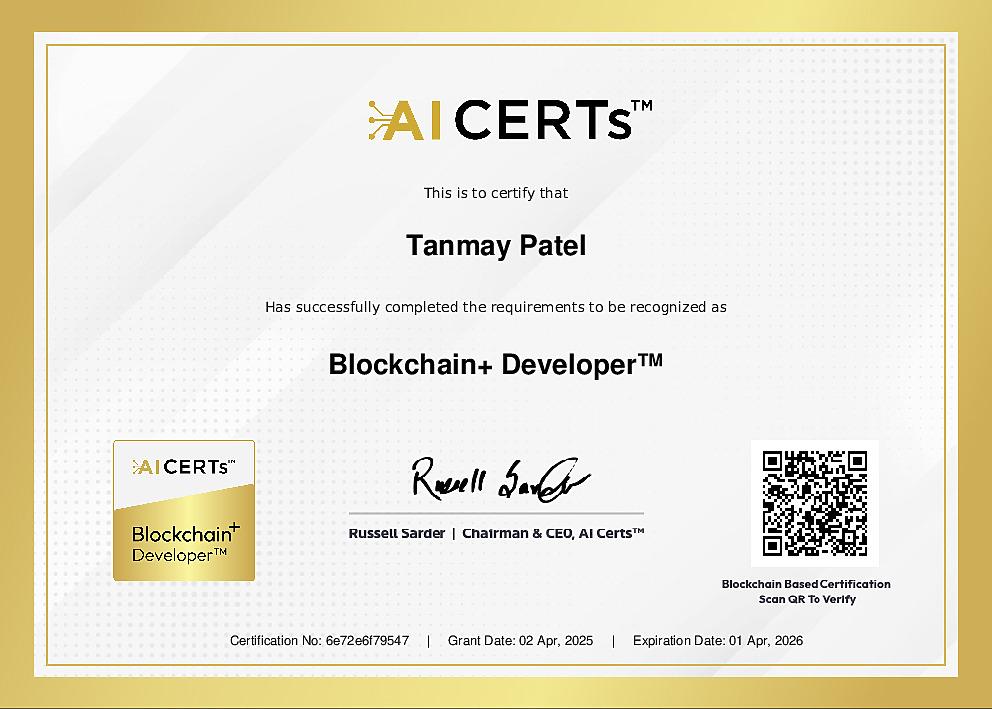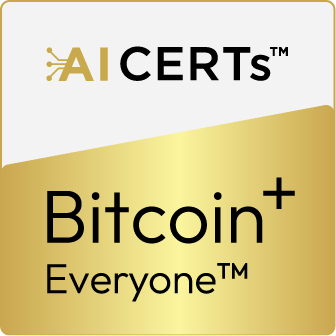Blockchain+ Developer™
BL-200
Build the Foundations of Tomorrow with Blockchain Developer- Career-Focused: Build expertise in blockchain and Bitcoin development
- Hands-On Skills: Tackle practical development work with future-oriented learning
- Innovation-Driven: Learn strategies for digital transformation and decentralized innovation
Why This Certification Matters
At a Glance: Course + Exam Overview
- Instructor-Led: 5 days (live or virtual)
- Self-Paced: 30 hours of content

Who Should Enroll?
Blockchain Developers: Gain the technical expertise needed to build and implement blockchain-based applications and solutions for diverse industries.
Software Engineers: Learn how to integrate blockchain technology into software development to enhance security, scalability, and efficiency.
Tech Innovators: Dive deep into blockchain development to stay at the forefront of technological advancements.
Fintech Developers: Explore blockchain’s role in transforming financial services, from digital wallets to decentralized finance (DeFi) applications.
Enterprise IT Professionals: Understand how to leverage blockchain to improve operational efficiencies, data integrity, and transparency within large organizations.
Industry Growth: Powering Next-Gen Infrastructure Across Finance, Supply Chain & Beyond
- The global blockchain development market is projected to grow at a CAGR of 68.2% from 2023 to 2030. (Source: Market Research Future)
- Blockchain technology is transforming industries like finance, supply chain, and healthcare, offering decentralized and efficient solutions for data management.
- The integration of blockchain for secure and transparent transactions is accelerating, with more businesses adopting blockchain platforms.
- Blockchain is becoming essential in sectors like banking and insurance, providing enhanced security, reducing fraud, and improving customer trust.
- Blockchain development is revolutionizing industries such as government and real estate, enabling secure data sharing, and reducing operational costs.

Skills you will gain
- Tokenization and ICO Management
- Blockchain Analytics and Visualization Tools
- Blockchain Interoperability and Cross-Chain Solutions
- Distributed Ledger Technology (DLT)
- Blockchain Performance Optimization
What You'll Learn
- Course Introduction
- 1.1 Origin of Blockchain
- 1.2 What is Blockchain?
- 1.3 Consensus Mechanisms
- 1.4 What are Smart Contracts?
- 1.5 Bitcoin Blockchains
- 2.1 What is an EVM and Ethereum?
- 2.2 Wallets Introduction and Creation
- 2.3 Introduction to Remix Editor with Metamask
- 2.4 Smart Contract Basic Structure
- 2.5 Variables, If/Else, Strings, Loops, Arrays, Test Tokens
- 3.1 Libraries, Interfaces, Modifiers
- 3.2 Structures, Enums, ABI, Calldata, Events, and Transfers
- 3.3 Contract-to-Contract Calls
- 3.4 Address and Address Payable
- 3.5 Receive and Fallback Functions
- 3.6 Upgradeable Contracts
- 3.7 Openzepplin Libraries
- 4.1 ERC20 Token Creation
- 4.2 NFT, NFT Minting, IPFS, Security, and Pinata Cloud
- 5.1 Truffle, Ganache, and Hardhat
- 5.2 Metamask Wallet
- 5.3 Remix Development Environment
- 5.4 Localnet and Testnet Deployment
- 6.1 Web3.0 Integration with JS
- 6.2 Wallet Creation and Sending Transactions
- 7.1 Public Vs Private vs. Consortium Blockchain Frameworks
- 7.2 Introduction to the Hyperledger Fabric
- 7.3 Hyperledger Projects
- 8.1 Basic Concepts of HLF
- 8.2 Docker Introduction
- 8.3 Commands and Setup
- 9.1 Installation and Path Setup
- 9.2 VS Code Plugin Setup, Variables, Strings, Conditional Statements, and Loops
- 9.3 Basics of the Language
- 10.1 Chain code Explanation using Fabric Samples and Test-network Explanation using Linux Scripting
- 10.2 Error Handling
- 10.3 Error Codes and Messages
- 10.4 Logging Errors
- 10.5 Handling Panics
- 11.1 Extending the Default Chaincode
- 11.2 Chaincode Deployment
- 11.3 REST API Integration with Front End
- 12.1 Why Smart Contract Audits are Necessary
- 12.2 Introduction to Firefly, Fabconnect, and Blockchain Explorer
Tools You'll Explore

Etherscan

Remix IDE

Hyperledger Fabric

Hardhat
Prerequisites
- Familiarity with general programming concepts like data structures, algorithms and networks.
- Understanding of at least one legacy programming stack (e.g. Python, JavaScript, Java or similar).
- Fundamental knowledge to use command line consoles on any operating system.
- Ability to understand developer concepts like SDKs, APIs, application development tools etc.
- Experience with building end to end tiered applications.
Exam Details
Duration
90 minutes
Passing Score
70%
Format
50 multiple-choice/multiple-response questions
Delivery Method
Online via proctored exam platform (flexible scheduling)
Exam Blueprint:
- Introduction to Blockchain and Smart Contracts - 5%
- Ethereum Virtual (EVM) and Solidity Basics - 5%
- Advanced Solidity and Structures - 10%
- Tokenization and NFTs - 10%
- Development Tools and Techniques - 5%
- DApp Integration and Testing - 5%
- Introduction to Private Blockchains -Hyperledger Fabric - 10%
- Deep Dive into Hyperledger Fabric - 10%
- Golang Programming for Hyperledger Fabric - 10%
- Chaincode Structure and Error Handling - 5%
- Custom Chaincode - 10%
- Smart Contract Auditing and Tools Hyperledger Fabconnect, and Firefly - 5%
Choose the Format That Fits Your Schedule
What’s Included (One-Year Subscription + All Updates):
- High-Quality Videos, E-book (PDF & Audio), and Podcasts
- AI Mentor for Personalized Guidance
- Quizzes, Assessments, and Course Resources
- Online Proctored Exam with One Free Retake
- Comprehensive Exam Study Guide
Instructor-Led (Live Virtual/Classroom)
- 5 days of intensive training with live demos
- Real-time Q&A and peer collaboration
- Led by AI Certified Trainers and delivered through Authorized Training Partners
Self-Paced Online
- ~30 hours of on-demand video lessons, e-book, and podcasts
- Learn anywhere, anytime, with modular quizzes to track progress
Discover Your Ideal Role-Based Certifications and Programs!
Not sure which certifications to go for? Take our quick assessment to discover the perfect role-based certifications and programs tailored just for you.
Get CertifiedFrequently Asked Questions
This certification prepares you for roles such as Blockchain Developer, Smart Contract Developer, DApp Developer, Blockchain Consultant, and more in industries like finance, healthcare, supply chain, and government.
Yes, the course includes hands-on exercises and case studies that involve real-world scenarios to help you apply the concepts learned.
In this course, you'll work on projects such as creating and deploying smart contracts, building decentralized applications (DApps), establishing private blockchain networks, and integrating blockchain with existing systems through REST APIs.
The course begins with foundational concepts of blockchain and smart contracts, progresses to advanced topics like Solidity structures and tokenization, and then explores Hyperledger Fabric for private blockchain development. Practical exercises and projects are included throughout the course.
The course covers essential tools such as Truffle for Ethereum smart contract development, Ganache for local blockchain testing, and Docker for Hyperledger Fabric setup. Participants will also use various integrated development environments (IDEs) for coding.


